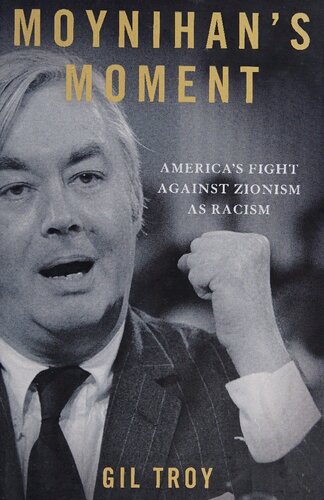

Most ebook files are in PDF format, so you can easily read them using various software such as Foxit Reader or directly on the Google Chrome browser.
Some ebook files are released by publishers in other formats such as .awz, .mobi, .epub, .fb2, etc. You may need to install specific software to read these formats on mobile/PC, such as Calibre.
Please read the tutorial at this link. https://ebooknice.com/page/post?id=faq
We offer FREE conversion to the popular formats you request; however, this may take some time. Therefore, right after payment, please email us, and we will try to provide the service as quickly as possible.
For some exceptional file formats or broken links (if any), please refrain from opening any disputes. Instead, email us first, and we will try to assist within a maximum of 6 hours.
EbookNice Team

Status:
Available4.4
41 reviews
ISBN-10 : 0199920303
ISBN-13 : 9780199920303
Author: Gil Troy
On November 10, 1975, the General Assembly of United Nations passed Resolution 3379, which declared Zionism a form of racism. Afterward, a tall man with long, graying hair, horned-rim glasses, and a bowtie stood to speak. He pronounced his words with the rounded tones of a Harvard academic, but his voice shook with outrage: "The United States rises to declare, before the General Assembly of the United Nations, and before the world, that it does not acknowledge, it will not abide by, it will never acquiesce in this infamous act."This speech made Daniel Patrick Moynihan, the U.S. ambassador to the United Nations, a celebrity, but as Gil Troy demonstrates in this compelling new book, it also marked the rise of neo-conservatism in American politics--the start of a more confrontational, national-interest-driven foreign policy that turned away from Kissinger's détente-driven approach to the Soviet Union--which was behind Resolution 3379. Moynihan recognized the resolution for what it was: an attack on Israel and a totalitarian assault against democracy, motivated by anti-Semitism and anti-Americanism. While Washington distanced itself from Moynihan, the public responded enthusiastically: American Jews rallied in support of Israel. Civil rights leaders cheered. The speech cost Moynihan his job--but soon won him a U.S. Senate seat. Troy examines the events leading up to the resolution, vividly recounts Moynihan's speech, and traces its impact in intellectual circles, policy making, international relations, and electoral politics in the ensuing decades. The mid-1970s represent a low-water mark of American self-confidence, as the country, mired in an economic slump, struggled with the legacy of Watergate and the humiliation of Vietnam. Moynihan's Moment captures a turning point, when the rhetoric began to change and a more muscular foreign policy began to find expression, a policy that continues to shape international relations to this day.
1 From “We the Peoples of the United Nations” to “The United States in Opposition”
2 The Ultimate Warrior-Diplomat
3 The “Fashionable Enemy”
4 Moynihan on the Move, October 1975
5 Oom, Shmoom: “Where are your Bloody Jews?”
6 The Speech
7 Backlash
8 Backlash Against Moynihan
9 The Politics of Patriotic Indignation
10 “Words Matter”
what is best moments
moynihan's law
q moments
z moments
0 moment
Tags: Moynihan, Moment, America, Against Zionism, Racism, Gil Troy